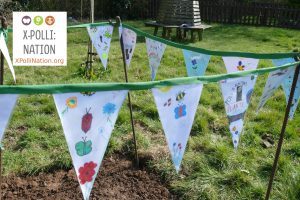News Story
New AI-enhanced learning about pollinators during Bees Needs Week
Monday 13 Jul 2020
As the COVID-19 pandemic puts the focus on literacy and numeracy in home-schooling, KMi researchers have developed technologies to also help families learn about the natural environment.
The Human-Computer Collaborative Learning in Citizen Science (X-Polli:Nation) project, which received £507,000 from the Engineering and Physical Research Council has responded to the pandemic by creating a new collection of interactive learning materials on the Open University’s OpenLearn Create Platform.
The course, A Cross-pollinated resource for pollinator citizen science, is being launched today at the beginning of Bees’ Needs Week (July 13-19 2020), an annual event coordinated by the Department for Environment, Food and Rural Affairs, working alongside charities, businesses, conservation groups and academic institutions to raise awareness of bees and other pollinators.
Innovative technologies and interactive interfaces
These courses, which are suitable for children aged seven and above and their parents and teachers, are designed around innovative research technologies developed through the project (by Nirwan Sharma, Stefan Rüger and Advaith Siddharthan), which investigates how Artificial Intelligence (AI) technologies can work alongside human intelligence in monitoring our natural environment and how people and AI can help each other in science learning.
The materials make it possible to learn to identify and distinguish different species of bumblebee and butterfly using an interactive identification key, seeking suggestions from automated image recognition and receiving formative feedback through automatically generated texts. There are also interfaces to explore which flowers attract which pollinators, and advice on what to plant is delivered through a recommender system.
As the research project develops novel technologies that mediate formal and non-formal science learning, indoor and outdoor learning, and home and school learning, this OpenLearn Create collection provides a fantastic and timely way for families and schools to explore these. We hope that learning about the diversity of pollinating insects can open a door to greater enjoyment of nature and spur societal action to protect it.
The learning materials and the wider project are part of a collaboration in X-Polli:Nation citizen science between The Open University, University of Aberdeen, Imperial College London, Learning through Landscapes, St Alban’s CE Aided Primary School and Museo Di Storia Naturale Della Maremma.

Latest News
KMi at the Palace of Westminster: Exploring Blockchain for Society and Economy
OUAnalyse at the Digital Ethics Summit 2025: Advancing Responsible AI in Education

